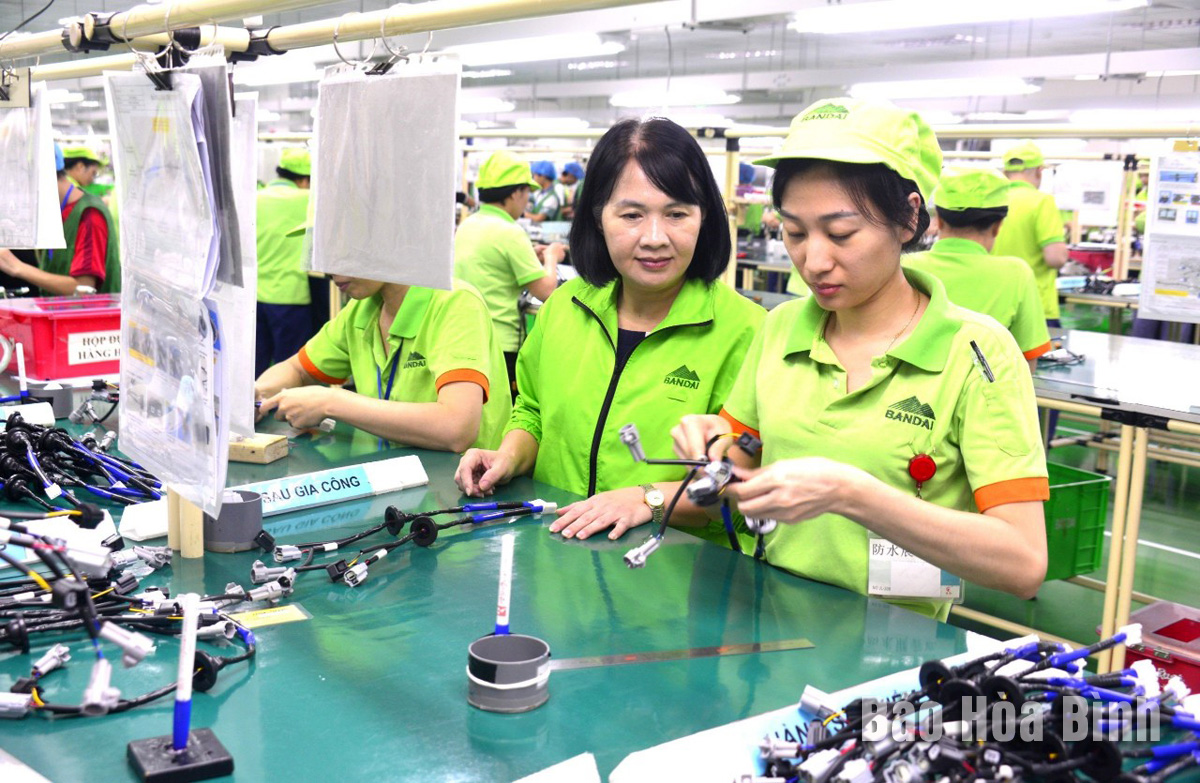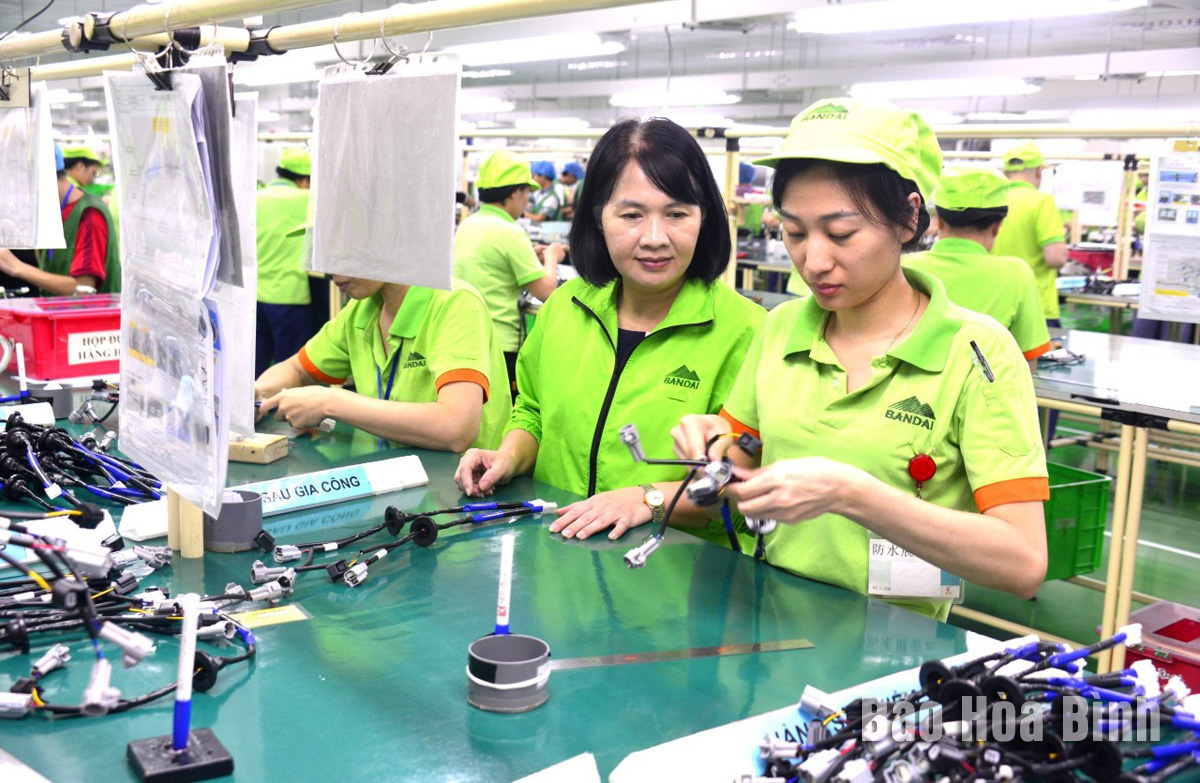
(HBO) – External relations of Hoa Binh province are being expanded and developed in a substantive and effective manner, helping mobilise and capitalise on resources for sustainable socio-economic development as in line with the resolution of the 17th provincial Party Congress (2020 - 2025 tenure). The province has held many meetings and working sessions with partners and organisations in and outside the province to bolster investment cooperation.
The Japanese-invested Bandai Vietnam Co. Ltd, based in
the Da River Left Bank Industrial Park of Hoa Binh city, has been operating
stably and providing jobs for a large number of local residents.
In mid-July, the provincial Party Committee and
People’s Committee in coordination with the Vietnamese Embassy in Thailand
organised an investment, trade and tourism promotion conference in Bangkok,
Thailand. This conference, the first Hoa Binh province had ever held in
Thailand, attracted the participation of many Thai organisations and
associations.
Also in July, a provincial delegation paid a
working visit to Tuv province of Mongolia to discuss cooperation in various
areas and help the two sides’ businesses explore partnership opportunities.
Enterprises of Hoa Binh expressed their hope to cooperate with Tuv in tourism;
export wood items and farm produce such as medicinal materials, essential oil,
oranges, and pomelos to Mongolia; and import goat and horse meat, mutton,
materials and products made from animal pelts and hides from this country.
Over the recent past, the provincial Party Committee
and People’s Committee have led and directed the concerted, creative, and
effective implementation of activities to enhance external relations in order
to attract investment and garner resources for socio-economic development.
Thanks to that, Hoa Binh’s solidarity, friendship, and cooperation with foreign
countries have been increasingly expanded and strengthened, thus generating
practical benefits.
Hoa Binh is implementing commitments and
agreements with such foreign localities as Luang Prabang and Houaphanh
provinces of Laos, Tuv province of Mongolia, Gimje city of Jeollabuk province
and Ulju district of Ulsan city in the Republic of Korea (RoK). All the
agreements are in line with Hoa Binh’s orientations for socio-economic
development and international cooperation expansion.
External economic activities have substantially
contributed to the shift in the local economic structure.
At present, there are 65 exporting and importing
enterprises in the province, comprising 17 trading in electronics, 20 in
textile and garment, two in metal products, nine in farm produce, and 17 in
other commodities.
Meanwhile, Hoa Binh is currently home 731
investment projects, including 37 foreign direct investment (FDI) ones worth 608
million USD and 694 domestic ones worth almost 201.8 trillion VND (8.4 billion
USD). Foreign enterprises, especially those from Japan and the RoK, are
recording fruitful production and business activities, thereby greatly
contributing to the province’s exports, State budget collection, and job
creation for locals.
There are currently 12 programmes and projects
funded with official development assistance (ODA) in the province, including
eight being implemented and four calling for ODA. Their total investment is estimated
at over 12 trillion VND.
Besides, Hoa Binh also houses 39 programmes and projects of
16 foreign non-governmental organiations, development cooperation agencies, and
sponsors. With 31.77 million USD in committed capital, they are carried out
mainly in the areas with socio-economic disadvantages, focusing on rural
development, health care, education, clean water supply, environmental hygiene,
and social affairs.
Implementing the Party’s policies on external
relations, Hoa Binh has proactively established relations and reinforced
cooperation with many international organisations so as to attract investment,
call for assistance, popularise the province’s images, and promote its stature
in the eyes of domestic and international friends./.
According to data from the Hoa Binh Provincial Party Committee, the industrial production index for the first six months of 2025 is estimated to have increased by 20% compared to the same period last year. This marks the highest year-on-year growth rate for this period since 2020.
In the first six months of 2025, Hoa Binh province’s export turnover was estimated at 1.145 billion USD, marking an 18.11% increase compared to the same period in 2024. Import turnover was estimated at $ 804 million, a 17.15% increase, which helped the province maintain a positive trade balance.
The lives of the ethnic minority farmers in Tan Lac district have gradually improved thanks to the new directions in agricultural production. This is a testament to the collective strength fostered through the professional associations and groups implemented by various levels of the district’s Farmers’ Union.
With the motto the "product quality comes first,” after nearly one year of establishment and operation, Muong village’s Clean Food Agricultural and Commercial Cooperative, located in Cau Hamlet, Hung Son Commune (Kim Boi district), has launched reputable, high-quality agricultural products to the market that are well-received by consumers. The products such as Muong village’s pork sausage, salt-cured chicken, and salt-cured pork hocks have gradually carved out a place in the market and they are on the path to obtaining the OCOP certification.
In the past, the phrase "bumper harvest, rock-bottom prices" was a familiar refrain for Vietnamese farmers engaged in fragmented, small-scale agriculture. But today, a new spirit is emerging across rural areas of Hoa Binh province - one of collaboration, organisation, and collective economic models that provide a stable foundation for production.
Maintaining growing area codes and packing facility codes in accordance with regulations is a mandatory requirement for agricultural products to be eligible for export. Recently, the Department of Agriculture and Environment of Hoa Binh province has intensified technical supervision of designated farming areas and packing facilities to safeguard the "green passport" that enables its products to access international markets.



